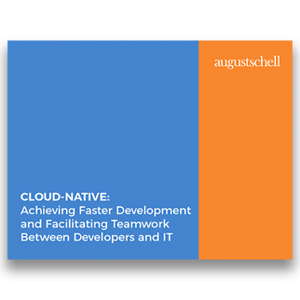Achieving a Consistent Operational Hybrid Cloud Experience Obstacles of a Hybrid-Forward Business...
What Is Pivotal?
Pivotal is a wholly owned subsidiary of Dell Technologies. It was originally founded as a software and services company by spinning out of EMC and VMware. The CEO of Pivotal, Rob Mee, is a software engineer by trade and founded Pivotal Labs in 1989, which was later acquired by EMC. Pivotal was essentially a merge between Pivotal Labs, Rob’s company, and several key assets from EMC and VMware.
Pivotal is supported by 3 main offerings: Labs, Cloud Foundry, and the Big Data Suite. Labs is based on agile principles with a unique services methodology called paired programming. Cloud Foundry is an open source Platform as a Service offering providing a choice of clouds, developer frameworks, and application services used to build continuous integration/continuous delivery of cloud native applications. Their Big Data Suite consists of an In-Memory Data Grid, a Data Warehouse and Hadoop Native SQL solutions that all work with Cloud Foundry or PCF.
Pivotal Labs is the services arm of the company and is designed to help customers build great cloud native applications and along the way learn Pivotal’s methodology for doing so. The idea is to teach customers how to apply agile and paired programming techniques to solve their own problems. Pivotal doesn’t want to build a huge services business, but they do want to help customer become great at building cloud native applications which will further the use of its PCF and Big Data solutions. The idea behind paired programming is to create a team of people who work on a specific project or task. The team then breaks up sub tasks into smaller parts and work on coding in pairs. Development pairs works side-by-side using the same computer with two screens, keyboards and mice. Both people see the same thing on their computer screen, both can type on their keyboard at the same time and they work together to solve problems and write the application code. In an effort to share the knowledge and spread the skills, the same pairs don’t always work together every day. Working side-by-side brings with it some valuable social aspects that make this methodology unique and worthwhile. For example, most developers begin solving a problem by writing code based on what they already know. In a pairing arrangement it’s more common to have a discussion first, then after ideas have been discussed, better code gets written as a result. Also, because you are working with someone else, consuming their time and energy, you tend to focus more on the task at hand and tend not to get as distracted as you might if you were working solo. Some people take to this arrangement better than others. In some situations, you undoubtedly end up with stronger and weaker contributors, which has the effect of vetting your development team. But usually everyone’s strengths come to bear on the outcome. It’s definitely different and a lot of companies (and government customers) will agree it’s an excellent way to develop really good software.
PCF is Pivotal’s curated version of the open source Cloud Foundry suite. The main goal with PCF is to provide a simple platform for developers to get their code deployed and running (Dev) and a simple automated way to manage infrastructure (Ops). The platform is compatible with all mainstream virtualization environments including VMware, OpenStack, Amazon, Azure, Google, etc. What this means is that software developed to run on VMware can also run on OpenStack or AWS or Google Compute Engine or Azure – unchanged! This is powerful software. Pivotal maintains this stack in such a way that improvements are made constantly. Using CI/CD principles makes your applications more secure and resilient. With CI/CD there is no patching of systems. Your application is delivered fresh as many times a day as you want. This prevents stale or out of spec code from persisting, thus making your system more secure.
The Big Data Suite from Pivotal provides a sensible backend for customers whose applications require interesting and forward thinking solutions to big data problems. Pivotal’s GemFire is the In-Memory Data Grid solution that provides real-time data to millions of users. Pivotal’s Greenplum is the Data Warehouse solution that enables storage and access to very large data sets with industry leading performance, and the Hadoop Native SQL solution is the Apache Hadoop native SQL database for data science and machine learning workloads. Each of these solutions provides unique, scalable and performant databases for use in PCF built applications.
Some takeaways: Pivotal is a company that delivers three things. One is a very well maintained version of the open source Cloud Foundry platform as a service called PCF. Another is a unique agile based development process that is offered as a service to customers through Pivotal Labs as a way to help customers develop great CI/CD cloud native applications and learn the process so they can continue using these techniques on their own going forward. The third is a set of Big Data products used for solving key database problems when building CI/CD cloud native applications. Pivotal is relatively small, but delivers tremendous value. It is definitely worth checking out if you want to know more.
Learn how and why the cloud-native methodology is about building and deploying applications for the cloud model, freeing developers and maximizing efficiency.




